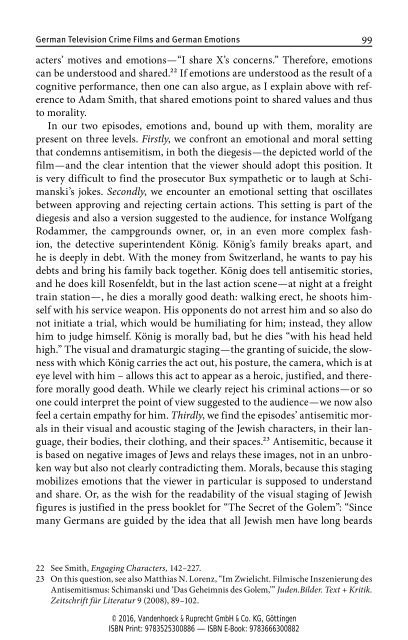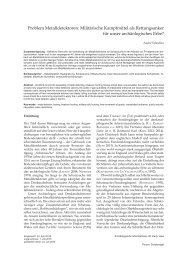Media and Minorities
9783666300882_ruhrmann_media_ebook_034247
9783666300882_ruhrmann_media_ebook_034247
Create successful ePaper yourself
Turn your PDF publications into a flip-book with our unique Google optimized e-Paper software.
German Television Crime Films <strong>and</strong> German Emotions 99<br />
acters’ motives <strong>and</strong> emotions — “I share X’s concerns.” Therefore, emotions<br />
can be understood <strong>and</strong> shared.22 If emotions are understood as the result of a<br />
cognitive performance, then one can also argue, as I explain above with reference<br />
to Adam Smith, that shared emotions point to shared values <strong>and</strong> thus<br />
to morality.<br />
In our two episodes, emotions <strong>and</strong>, bound up with them, morality are<br />
present on three levels. Firstly, we confront an emotional <strong>and</strong> moral setting<br />
that condemns antisemitism, in both the diegesis — the depicted world of the<br />
film — <strong>and</strong> the clear intention that the viewer should adopt this position. It<br />
is very difficult to find the prosecutor Bux sympathetic or to laugh at Schimanski’s<br />
jokes. Secondly, we encounter an emotional setting that oscillates<br />
between approving <strong>and</strong> rejecting certain actions. This setting is part of the<br />
diegesis <strong>and</strong> also a version suggested to the audience, for instance Wolfgang<br />
Rodammer, the campgrounds owner, or, in an even more complex fashion,<br />
the detective superintendent König. König’s family breaks apart, <strong>and</strong><br />
he is deeply in debt. With the money from Switzerl<strong>and</strong>, he wants to pay his<br />
debts <strong>and</strong> bring his family back together. König does tell antisemitic stories,<br />
<strong>and</strong> he does kill Rosenfeldt, but in the last action scene — at night at a freight<br />
train station — , he dies a morally good death: walking erect, he shoots himself<br />
with his service weapon. His opponents do not arrest him <strong>and</strong> so also do<br />
not initiate a trial, which would be humiliating for him; instead, they allow<br />
him to judge himself. König is morally bad, but he dies “with his head held<br />
high.” The visual <strong>and</strong> dramaturgic staging — the granting of suicide, the slowness<br />
with which König carries the act out, his posture, the camera, which is at<br />
eye level with him – allows this act to appear as a heroic, justified, <strong>and</strong> therefore<br />
morally good death. While we clearly reject his criminal actions — or so<br />
one could interpret the point of view suggested to the audience — we now also<br />
feel a certain empathy for him. Thirdly, we find the episodes’ antisemitic morals<br />
in their visual <strong>and</strong> acoustic staging of the Jewish characters, in their language,<br />
their bodies, their clothing, <strong>and</strong> their spaces.23 Antisemitic, because it<br />
is based on negative images of Jews <strong>and</strong> relays these images, not in an unbroken<br />
way but also not clearly contradicting them. Morals, because this staging<br />
mobilizes emotions that the viewer in particular is supposed to underst<strong>and</strong><br />
<strong>and</strong> share. Or, as the wish for the readability of the visual staging of Jewish<br />
figures is justified in the press booklet for “The Secret of the Golem”: “Since<br />
many Germans are guided by the idea that all Jewish men have long beards<br />
22 See Smith, Engaging Characters, 142–227.<br />
23 On this question, see also Matthias N. Lorenz, “Im Zwielicht. Filmische Inszenierung des<br />
Antisemitismus: Schimanski und ‘Das Geheimnis des Golem,’” Juden.Bilder. Text + Kritik.<br />
Zeitschrift für Literatur 9 (2008), 89–102.<br />
© 2016, V<strong>and</strong>enhoeck & Ruprecht GmbH & Co. KG, Göttingen<br />
ISBN Print: 9783525300886 — ISBN E-Book: 9783666300882







